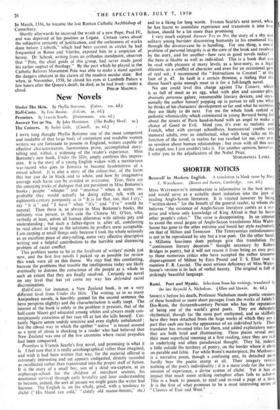New Novels
I HAVE long thought Phyllis Bottome one of the most competent and readable of that large body of competent and readable women writers we are fortunate to possess in England, writers capable of effective characterisation, harmonious prose, accomplished story- telling and, withal, a widening of the reader's experience. Miss Bottome's new book, Under the Skin, amply confirms this impres- sion. It is the story of a young English widow with a meritorious war-record who goes to Jamaica to become headmistress of a mixed school. It is also a story of the colour-bar, of the harm this bar can do to black and to white, and how by imaginative courage such harm can be avoided or overcome. True, there are the annoying tricks of dialogue that are persistent in Miss Bottome's books ; people - whisper " and " murmur " when it seems im- probable they would actually be doing either, talk with an eighteenth-century pomposity as in " It is for that, too, that I cry," say " it is " and " I have " when " it's " and " I've " would be natural. Then there is, as always in Miss Bottome's books, the infinitely wise person, in this case the Chinese Mr. O'San, who, verbally at least, solves all human dilemmas with infinite pity and understanding ; but such a father-figure is, after all, comforting to read about so long as the solutions he proffers seem acceptable. I am carping at small things only because I took the whole seriously as an excellent piece of story-telling, some very effective descriptive writing and a helpful contribution to the horrible and distressing problem of racial conflict. This problem seems to be in the forefront of writers' minds just now, and the first five novels I picked up as possible for review this week were all on this theme. We may find this comforting, because the problems that trouble the intelligentsia today are likely eventually to distress the conscience of the people as a whole to such an extent that they are finally resolved. Certainly no novel on any level that has yet come my way has defended racial discrimination.
Half-Caste, for instance, a New Zealand book, is on a very different level from Under the Skin. The writing, as in so many Antipodean novels, is horribly genteel (in the second sentence the hero perspires slightly) and the characterisation is sadly inept. The interest of the book is solely in the problem it presents, that of the half-caste Maori girl educated among whites and always made con- temptuously conscious of her race till at last she kills herself. Cer- tainly Ngaire seems unduly sensitive and even slightly unbalanced ; but the casual way in which the epithet " native " is tossed around as a term of abuse is shocking to a reader who had believed that New Zealand was one of the few countries where racial prejudice had been conquered.
Promises is Francis Scarfe's first novel, and promising is what it is. I feel sure that it is really autobiographical rather than imagined, and wish it had been written that way, for the material offered is extremely interesting and yet appears undigested, directly recorded as recollected rather than transmuted into the proper stuff of fiction. It is the story of a small boy, son of a dead sea-captain, at an orphanage-school for the children of merchant seamen, his emotional survival through early-brutality and later understanding to become, indeed, the sort of person we might guess the writer had become. The English is, on the whole, good, with a tendency to cliché (" His blood ran cold," " stately old manor-houses," etc.) and to a liking for long words. Francis Scarfe's next novel, when he has learnt to assimilate experience and transmute it into true fiction, should be a lot more than promising.
I very much enjoyed Answer Yes or No, the story of a shy and solitary young barrister discovering humanity in his emotional life through the divorce-case he is handling.. For one thing, a moral problem of personal integrity is at the core of the book and resolved by the story, and for another—how rare in good novels today! the hero is likable as well as individual. This is a book that can be read with pleasure at many levels, as a love-story, as a legal dilemma, as a conflict of character and even for an occasional gem of real wit ; I recommend the " Instructions to Counsel " at the foot of p. 47. Its fault is a certain thinness, a feeling that the theme hasn't quite enough meat in it for a full-length novel.
No one could level this charge against The Coiners, which is as full of meat as an egg, what with plot and counter-plot, dramatis personae galore, innumerable literary devices, and occa- sionally the author himself popping up in person to tell you what he thinks of his characters' development so far and what he surmises
they are likely to do next. For me the whole book reeked of pedantic whimsicality which culminated in young Bernard being led
about the streets of Paris hand-in-hand with an angel to make a choice of Good or Evil. Mind you, it's ever so realistic and French, what with corrupt schoolboys, homosexual youths and immoral adults, ever so intellectual, what with long talks on the function of the novel, in realms far too rarefied for me, ever ever so sensitive about human relationships ; but even with all this and the angel, too, I just couldn't take it. For another opinion, however, I refer you to the adjudicators of the Nobel Prize.
MARGHANITA LASKI.






































 Previous page
Previous page